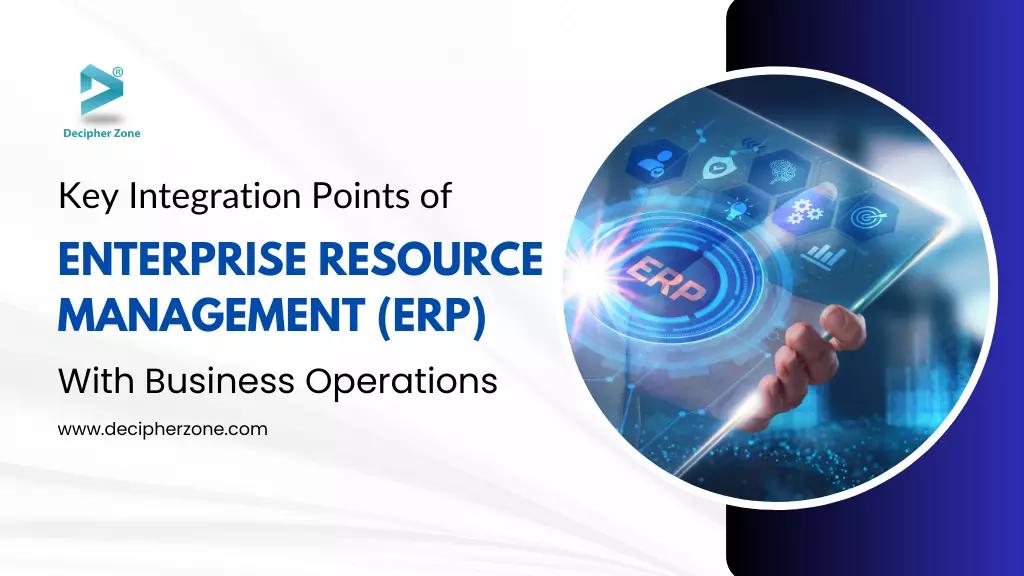In today's rapidly evolving business landscape, efficient integration and streamlined processes are more than just buzzwords; they are critical components for success. Enter enterprise resource planning (ERP) systems. These powerful tools are at the forefront of bridging gaps and creating a unified data environment for companies across the globe.
Read: Best Practices for ERP Implementation
According to a report by Statista, global spending on ERP software reached over $45 billion in 2022 and is projected to reach $62 billion by 2028. This staggering number underscores the value and reliance businesses place on ERP systems.
But where does this integration magic happen?
Key Integration Points of ERP With Business Operations
In this post, we'll delve into six pivotal areas where ERP seamlessly integrates with business processes, enabling organizations to optimize operations, reduce inefficiencies, and drive impactful results. Dive in with us to understand the synergy between ERP systems and the modern business landscape.
Read: ERP Application Development

1. Finance and Accounting
One of the most critical aspects of any business is its financial health. ERP systems play a pivotal role in this realm by centralizing financial data and automating various accounting processes. From accounts payable and receivable to general ledger management and budgeting, ERP integration ensures that financial information is easily accessible and accurately represented.
Read: Financial Services Software Solutions
Moreover, with the advent of cloud-based ERP systems, businesses can benefit from real-time financial insights anywhere, anytime. The implementation of cloud ERP systems ensures reduced IT costs, better security, and the ability to quickly adapt to changing business needs. Empowering decision-makers with accurate information at their fingertips, streamlined financial processes pave the way for organizations to allocate resources more effectively, identify cost-saving opportunities, and adhere to compliance standards effortlessly.
2. Supply Chain Management
Efficient supply chain management is the backbone of delivering products and services to customers promptly. ERP systems step in to optimize this crucial aspect by integrating inventory management, procurement, and demand forecasting. The result? A seamlessly connected supply chain that operates in harmony.
Read: How Will Blockchain and IoT Impact Supply Chain & Logistics
Through ERP integration, order processing becomes more efficient, lead times are reduced, and inventory control is enhanced. This integration ensures that the entire supply chain is tracked and managed within a single system, preventing disjointed processes and delays. With a well-integrated supply chain, businesses can respond swiftly to market demands and changes, thereby improving customer satisfaction and loyalty.
3. Human Resources
The heartbeat of any organization is its workforce, and managing human resources efficiently is vital for sustained success. ERP systems contribute to this by integrating various HR functions, including employee data management, payroll processing, benefit administration, and performance management.
With self-service portals for employees and managers, ERP integration simplifies HR processes, reduces administrative overhead, and allows for better employee engagement. Managers can access performance data, facilitate talent development, and make informed decisions. This integration also empowers strategic workforce planning, helping businesses align their human resources with their growth objectives.
4. Customer Relationship Management (CRM)
In the age of customer-centricity, maintaining strong relationships with clients is non-negotiable. Here is where ERP-CRM integration comes into play, offering a comprehensive view of customer interactions, sales, and service requests.
Read: CRM in Real Estate
Gone are the days of fragmented customer data across different systems. With ERP-CRM integration, businesses gain insights into customer preferences and behaviors, enabling personalized experiences and targeted marketing efforts.
Read: CRM Software for Small Businesses
Sales teams benefit from accurate sales tracking, while customer support agents have access to historical interactions, leading to faster and more effective issue resolution. The result? Improved customer satisfaction and loyalty.
5. Production and Manufacturing
For businesses in the manufacturing and production industries, optimizing processes is paramount. ERP systems are instrumental in this domain as well, integrating planning, scheduling, quality control, and resource allocation seamlessly.
Read: Software Solutions for Manufacturing Industry
The real-time monitoring capabilities provided by ERP integration empower manufacturing teams to identify bottlenecks, make agile decisions, and optimize resource utilization. Collaboration across departments becomes more straightforward, resulting in synchronized efforts toward production goals. In a sector where efficiency and precision matter most, ERP integration elevates the manufacturing process to new heights.
6. Project Management
Managing projects efficiently is essential for meeting deadlines and achieving organizational goals. ERP systems play a critical role in project management by integrating planning, resource allocation, task tracking, and progress monitoring.
Read: Project Management Software Development Cost
Through ERP integration, project managers can allocate resources effectively, track tasks in real time, and monitor the overall progress of projects. This integration ensures that all stakeholders have access to the same project-related information, fostering better communication and collaboration. With ERP-enabled project management, businesses can meet project milestones with greater accuracy and timeliness.

Final Thoughts
In today's dynamic business landscape, ERP integration stands as a true catalyst for operational excellence. As we've explored across finance, supply chain, HR, CRM, production, and project management, ERP systems create a cohesive tapestry of efficiency and insight.
Embracing ERP integration is not just a choice but a strategic imperative, propelling businesses to navigate complexity, seize opportunities, and foster enduring growth in an interconnected world.

